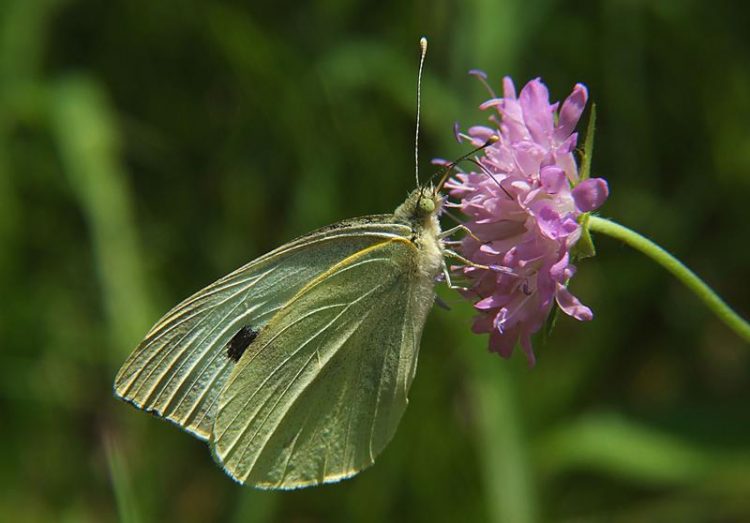Maternal experience brings an evolutionary advantage

A female of the small cabbage white (Pieris rapae) species of butterfly. Gebhard Müller
In their study, the researchers working under Prof. Andreas Erhardt firstly confirmed their earlier results, which showed that parent generations of butterflies can condition their offspring to the quality of forage plants that they experienced as larvae.
Secondly, they were able to provide evidence for the first time that the mothers of these offspring change their egg-laying behavior and prefer to deposit their eggs on plants on which they themselves once developed.
The Basel-based environmental scientists showed that young females of the small cabbage white (Pieris rapae) were more precise than their parents in laying their eggs on the very same plants that they (and their parents) experienced as larvae.
This provided the scientists with proof of the adaptation process. In their study, the scientists used cabbage as a host plant and added either a large or a small quantity of nitrogen to it, bearing in mind that fertilization with nitrogen is favorable for the development of butterfly larvae.
Although the plant containing more nitrogen therefore represented the better choice, females that had developed as caterpillars on plants with less nitrogen showed a tendency to lay their eggs on the unfertilized cabbage.
Accelerated speciation
This kind of breeding behavior has implications for our understanding of evolutionary and ecological processes. The conditioning of the offspring to the parents’ own experiences only takes place if the offspring grow up in a similar environment to the parent generation. In species in which this conditioning occurs, the preference for the corresponding experience is therefore reinforced with each generation. This breeds offspring that are increasingly better adapted to the respective host plant, even if this actually doesn’t provide optimal conditions – and, as a result, new species can emerge more quickly and more easily.
Although the conditioning may have succeeded in reducing the disadvantage caused by the less-favorable environment, it has not eradicated it completely. In compensation, females that accept or even prefer the disadvantageous environmental conditions have access to a greater selection of plants on which to lay their eggs, which leads to a reduction in competition within the species.
Original source
Fabian Cahenzli, Barbara A. Wenk, and Andreas Erhardt
Female butterflies adapt and allocate their progeny to the host-plant quality of their own larval experience
Ecology 96:1966–1973 (2015), doi: 10.1890/14-1275.1
Further information
Prof. Dr. Andreas Erhardt, University of Basel, Department of Environmental Sciences, Section of Conservation Biology, Tel. +41 61 267 08 33, email: andreas.erhardt@unibas.ch
https://www.unibas.ch/en/News-Events/News/Uni-Research/Maternal-experience-bring…
Media Contact
All latest news from the category: Life Sciences and Chemistry
Articles and reports from the Life Sciences and chemistry area deal with applied and basic research into modern biology, chemistry and human medicine.
Valuable information can be found on a range of life sciences fields including bacteriology, biochemistry, bionics, bioinformatics, biophysics, biotechnology, genetics, geobotany, human biology, marine biology, microbiology, molecular biology, cellular biology, zoology, bioinorganic chemistry, microchemistry and environmental chemistry.
Newest articles

Making diamonds at ambient pressure
Scientists develop novel liquid metal alloy system to synthesize diamond under moderate conditions. Did you know that 99% of synthetic diamonds are currently produced using high-pressure and high-temperature (HPHT) methods?[2]…

Eruption of mega-magnetic star lights up nearby galaxy
Thanks to ESA satellites, an international team including UNIGE researchers has detected a giant eruption coming from a magnetar, an extremely magnetic neutron star. While ESA’s satellite INTEGRAL was observing…

Solving the riddle of the sphingolipids in coronary artery disease
Weill Cornell Medicine investigators have uncovered a way to unleash in blood vessels the protective effects of a type of fat-related molecule known as a sphingolipid, suggesting a promising new…





















